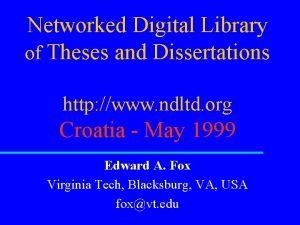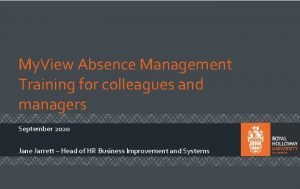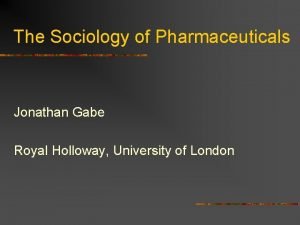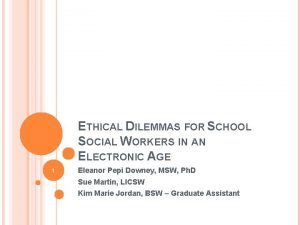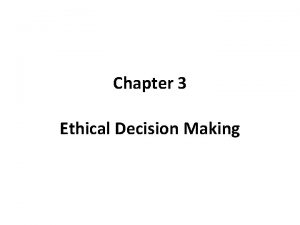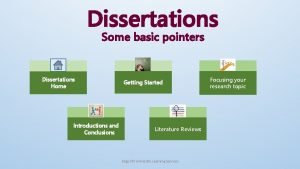Dissertations Dilemmas and Potential Solutions Royal Holloway Workshop








- Slides: 8

Dissertations: Dilemmas and Potential Solutions Royal Holloway Workshop – February 13, 2013 Facilitators: Richard Atfield and Lynn Vos, HEA

Agenda Welcome – Michael Gold • Richard Atfield – Overview of HEA • Lynn Vos – Review of recent literature on dissertations – key themes, key issues • Open Discussion 1. Students’ expectations? 2. Academics’ expectations, issues and concerns? 3. Institutional expectations? Employer expectations? 4. Current guidance document and marking criteria 5. Way forward

Key themes and sub-themes in the literature 1. The student/supervisor relationship • Differences in student/supervisor expectations & perceptions; • Differences in supervisors’ approaches to supervision and how they view their role; • Different student “types” and their approaches; • Value of planning, guidance documents , marking criteria and checklists; • Issues in communication: tacit vs explicit; misunderstandings; cultural and language issues; • Need for training for supervisors; the lack of; and, • Tools to help gain insights into students’ experiences.

2. Teaching and learning research methods • Variations in how research methods are taught; • Problems of failing the research proposal; • Challenges associated with teaching and learning research methods; and, • The need for specific research methods training for supervisors and teachers. 3. Challenges at various stages of the process; motivation • Overview of typical challenges and how to help students at various stages; • Writing and argumentation challenges; • Challenges at the topic selection and problem definition stages; • The variety and range of skills needed to successfully complete; and, 4

Key themes, cont. 4. Challenges associated with student diversity, cultural background and prior preparation • Challenges faced by non-native English speakers including language; • Being new to a discipline and discourse community; • Issues of social isolation; and • Specific challenges faced by Chinese and Indian students. 5. Plagiarism and Academic Dishonesty • As part of a wider problem including cultural, educational, professional predispositions; unfamiliarity with culture of discipline; • Scope of the problem and growing use of academic writing services; • Institutional failures in and challenges to detecting/tackling plagiarism/cheating; 5

Anecdotal Comments Supervisors • Masters programmes are now shorter, but no changes have been made to the dissertation • Growing number of students (including need to quality assure overseas franchises, branch campus dissertations, but no increase (or even decreases) in resources to supervise (Rising SSR’s) • Language skills of international students very weak, particularly in reading comprehension, general writing, and argumentation. • Even if trained, research skills required are very weak; weak students • Difficulties in critical thinking, evaluation and argumentation • More and more “difficult to detect” plagiarism/dishonesty and no use of vivas • Students often don’t seem motivated, don’t come to training sessions, fail to turn up to appointments; don’t take comments on board 6

Student comments – from the literature. different supervisors expect different things of their students, have different approaches, differences in what they view as important (students talking to each other!). waiting long periods for feedback. meetings often too short. hard to contact supervisor. how do I choose the best research method? . what does it mean to take a “theoretical perspective”, to be “critical”? ]. I don’t understand what my supervisor is saying…. 7

From the summary…. Food for thought “The literature makes it clear that many of the challenges associated with dissertations are related to misunderstandings on the part of both students and supervisors about the difficulties faced by both groups and to underlying issues of communication and differences in expectations” p. 9 -Vos, L. (2013) Dissertation study at postgraduate level: A review of the literature, York: Higher Education Academy. 8
